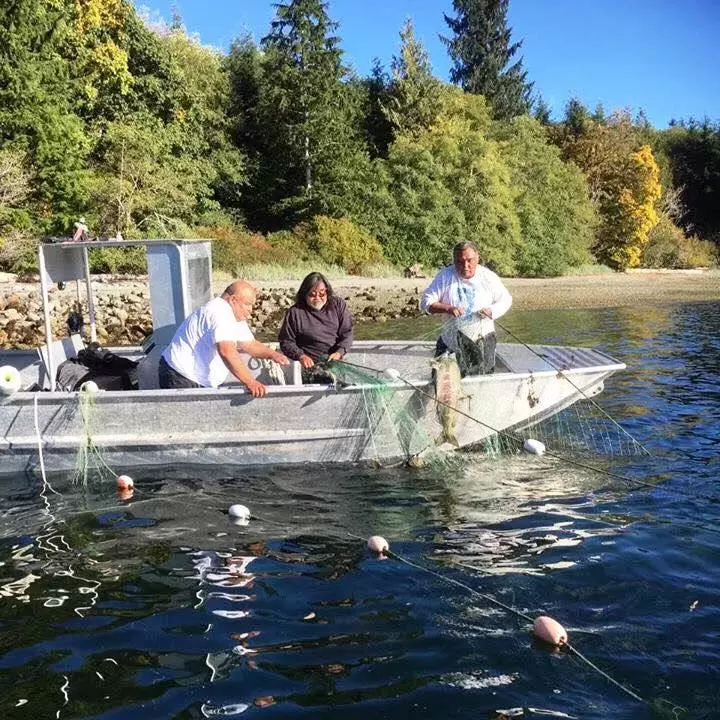After years of stalled negotiations, progress has been made to allow five Nuu-chah-nulth nations to harvest and sell fish found in their territories, according to the T’aaq-wiihak fisheries coordinator. Alex Gagne expects that a decision from the federal government on how Canada will support the nations’ access to their sea resources could come by the end of the year.
The update was given to Nuu-chah-nulth delegates during the Council of Ha’wiih Forum on Fisheries, which was held in Port Alberni on Oct. 2 and 3. In recent years a court ruling recognizing five Nuu-chah-nulth nations’ aboriginal right to harvest and sell fish from their waters has been stalled by appeals from the federal government and a justification trial over why the nations’ rights were infringed upon. But since May discussions with federal officials have progressed, said Gagne. The T’aaq-wiihak case involves the Ahousaht, Mowachaht Muchalaht, Ehattesaht, Hesquiaht and Tla-o-qui-aht First Nations.
“The amount of progress I’ve seen in the last six months is more than I’ve seen in the last five years combined,” said Gagne, who most recently discussed supporting the nations’ fisheries with officials from Indigenous and Northern Affairs and Fisheries and Oceans Canada in mid September. “They have agreed that the goal was to come to a point where they could bring forth a memorandum to cabinet this fall.”
She added that T’aaq-wiihak’s lawyers are optimistic a decision will be made by Christmas, which would show a momentous turnaround of negotiations since progress halted in 2016.
“In September of last year – over a year ago now - the five nations respectfully asked DFO to leave the room, stop negotiations until they have a mandate to actually negotiate with the nations,” Gagne said, adding that this came after years of negotiations “that really didn’t go anywhere.”
Jim Lane, Uu-a-thuk’s southern region biologist, noted that although a decision from Ottawa is expected by the end of the year, the nations involved will not see changes until later in 2018.
“Once the cabinet decision and treasury board approval for funding to support the nations’ fishing rights is made, actual negotiations of how the fisheries will be implemented will begin,” he said. “Probably nothing until sometime in 2018 - and it will probably be done incrementally to allow time for the nations’ capacity to harvest more fish to develop, and Canada time to acquire the fish access.”
The T’aaq-wiihak case seeks to implement a ruling that originally came from the Supreme Court of B.C. in 2009. Canada disputed the Nuu-chah-nulth right to harvest and sell fish from the nations’ territories in the B.C. Court of Appeal, but in 2011 this court affirmed the right of the five nations involved – with the exception of geoduck clams. The following year the Supreme Court of Canada refused to hear Canada’s challenge to the fishing rights decision, then in early 2014 the country’s highest court again denied Canada’s request to appeal the ruling, thereby protecting the five Nuu-chah-nulth nations’ rights under the Canadian Constitution.
A justification trial has been underway since March 2015, additional legal proceedings that have frustrated members of the five nations who would rather be on the water pursuing a livelihood than awaiting the implementation of the 2009 B.C. Supreme Court ruling. On Oct. 3 officials from Fisheries and Oceans Canada were present at the Council of Ha’wiih Forum.
“Here we are eight years later,” said Kiista (Keith Atleo), the Ahousaht representative for A-in-chut (Shawn Atleo). “I’m hoping that, as our Ha’wilth said earlier, you really consider following through with this.”
As the nations await the result of negotiations, T’aaq-wiihak has operated small-scale demonstration fisheries to support future development. This year a chinook demonstration fishery ran for 79 days, entailing 262 fishing trips with 66 participants. The total chinook caught was 6,877, plus nearly 4,500 pounds of halibut, generating over $670,000 in revenue. Another smaller chinook demonstration fishery in the Mowachaht Muchalaht territory brought in $150,000.







